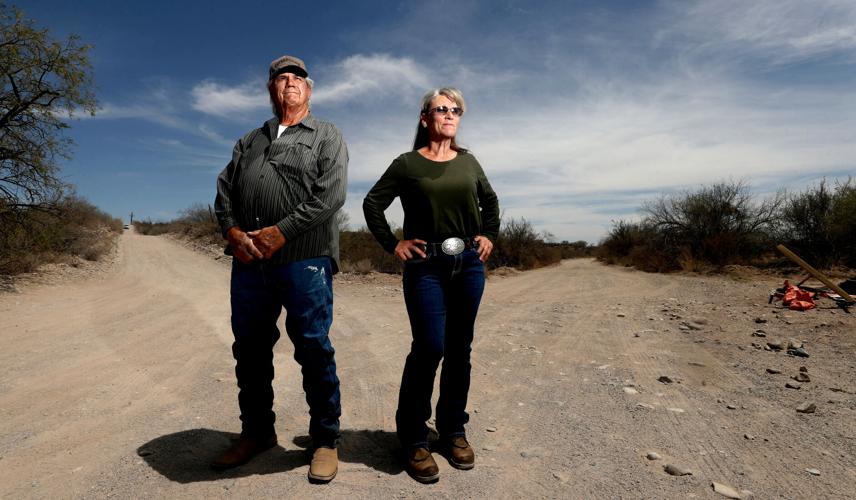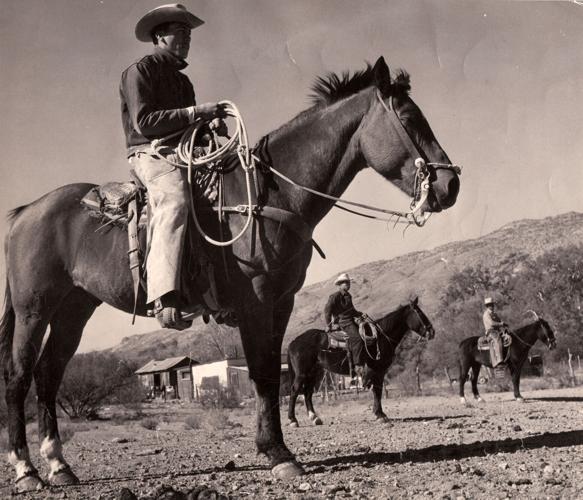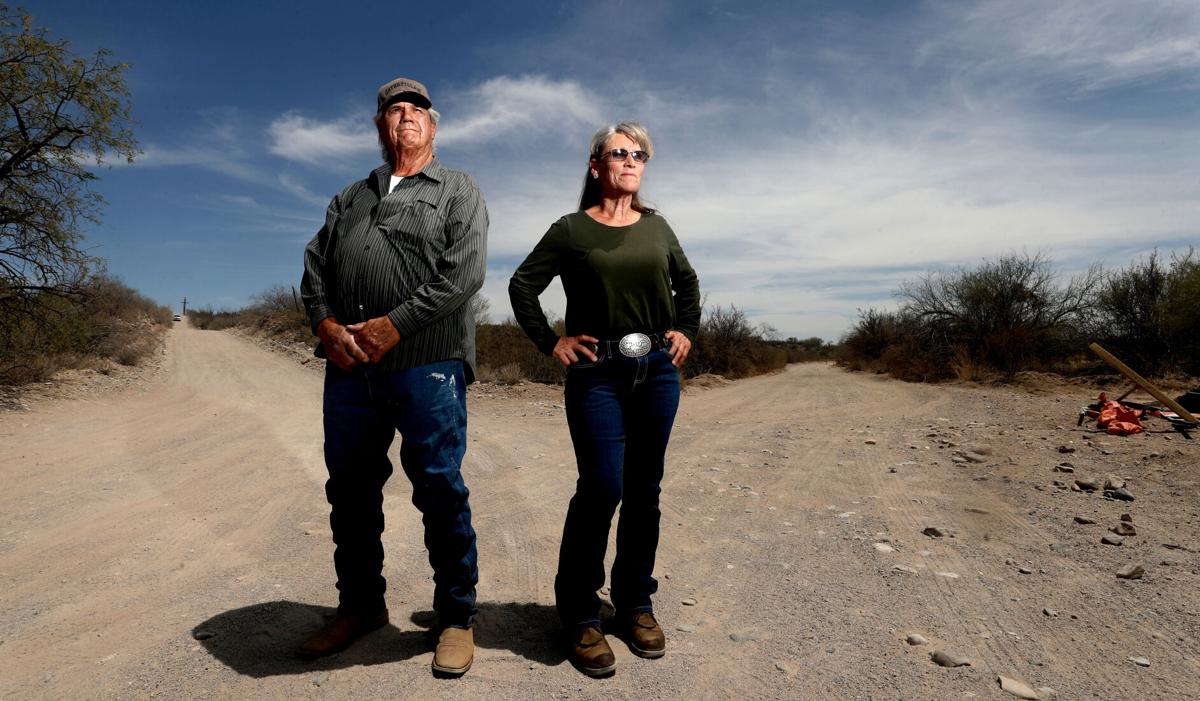Folks in this part of Vail are accustomed to rough roads and detours.
The residents on Leon Ranch Road have been finding creative new ways in and out of their rural neighborhood for years, as new subdivisions of tightly packed tract homes have closed in around them, transforming their community.
Now, though, nearby development has reduced them to only one option: a steep and narrow dirt road with a blind spot at its crest that has them worried about accidents and the prospect of being cut off completely.
“If we had another route out that was safe, you wouldn’t be hearing from us,” said Marilyn Dailey, who is organizing the neighborhood’s response to the issue.
The problem involves two new subdivisions along the east side of Pantano Wash.
Richmond American Homes started construction last year on Riverwalk at Rancho Del Lago, an 85-home development on about 46 acres. Immediately to the north, Pepper Viner Homes expects to start grading lots later this year for its Pinnacle at Del Lago, a 28-acre gated community with 29 homes.
Based on planning documents, the two projects are expected to erase a dirt road Dailey and her neighbors have been using — and maintaining themselves — for years.
The road is not recognized by Pima County, but it does show up on Google Maps under two different names: Monthan Ranch Road and Pugly Lake Drive.
“It has been maintained for over 17 years that I know of at the expense of the homeowners on Leon Ranch. A large blade was brought in, sometimes fill dirt,” Dailey said. “No one had ever given me permission nor tried to stop me from using it.”
That changed early this year, when residents began hearing that their main route in and out might soon be blocked by construction crews. The barricades went up in February.
Since then, the only way for Dailey and company to get out of their neighborhood is Vail Ranch Road, a single lane of rocks and dirt that climbs almost 80 vertical feet in less than one-sixth of a mile.
There’s no room to pull over. If you meet another vehicle coming the other way, one of you will have to back up. If a big truck gets stuck on the hill, everyone else on Leon Ranch Road is stranded, too.
“We’re nothing fancy back here, but that’s where we are,” said Dailey, a resident since 2006.
The closure impacts about two dozen homes. Resident Maria Burnham said the hill is “dangerous as all get out,” and she can’t make it safely up there with her horse trailer in tow.
The Vail School District has stopped sending school buses down the road, opting instead to pick up kids in a van.
The rough conditions pose a similar challenge for garbage collection, package delivery and other increasingly essential pandemic services. Dailey also worries about emergency vehicles negotiating the hill, especially in bad weather.
“I would not have purchased the property if I thought I would ever be forced into taking the hill at Vail Ranch Road,” she said. “We don’t use it because it’s dangerous.”
Except soon they might not have a choice.
Road with a past
Leon Ranch and its road date back more than a century, when Santiago and Mariana Leon homesteaded the land along the Pantano Wash in 1912.
“Before Arizona was a state, my grandfather was here,” said Art Leon, who has lived on the property for 60 years.
The old ranch road used to go all the way through — across the wash and north into the Rincon Valley — but now it dead-ends just past the Leon Cemetery, where Art Leon said about half of his relatives are buried.

Ranchers, left to right, Oscar Leon, Jimmy Leon and Eddie B. Lopez in Vail, circa 1950. According to family, the Leon brothers used to work for the county road department and always kept their ranch road nice and smooth.
He said his dad and his uncle worked for the county road department, so the dirt road leading out of the family’s ranch was always nice and smooth like pavement.
Local Vail historian J.J. Lamb said it wasn’t widely known as Leon Ranch Road until the early 1970s, after the original property was divided up among Santiago and Mariana Leon’s surviving children.
Lamb is president of the Vail Preservation Society, a nonprofit dedicated to protecting the community’s history.
She said she helped launch the organization in 2006 in part because of an earlier road dispute in the same general area. A developer with little regard for the community’s rural roots paved part of a dirt road favored by nearby residents, then put in a curb that blocked the remaining unpaved portion of the road.
Change happens, Lamb said, but to literally cut off access routes used by older neighborhoods is “so disrespectful.”
The curb was eventually removed and the road reopened, but it took some doing.
Now Lamb is trying to help Dailey and company with their problem, which she describes as “a David and Goliath story that is repeated on a regular basis.”
If it were up to Lamb, the new subdivisions that have popped in Vail in recent years would be a bit more connected to — and reflective of — the community’s decidedly less master-planned past.
“When we’re always building walls around our neighborhoods, we end up building a very siloed society,” she said.
The builders are not entirely to blame. Lamb said they have the right to develop their property and “make a buck,” same as anyone else in America. She just wishes more of an effort was made — by both developers and the county officials that regulate them — to weigh and mitigate the impact of these subdivisions on neighboring residents.
“Everyone’s following the rules,” Lamb said, “which is why the rules have to change.”
Private property
Not long before the barriers went up at the south end of Leon Ranch Road, Dailey and Lamb sought help from County Supervisor Steve Christy, whose District 4 includes Vail.
Christy responded by organizing a meeting in February with county staff to discuss the situation.
The news wasn’t promising.
In a memo to Christy, county Development Services Director Carla Blackwell and Transportation Director Ana Olivares explained that the route in question crosses private land and “is not an established roadway, nor was it ever officially named.”
Plat maps for the two subdivisions were approved by the county in 2007, and a title report completed at that time “did not indicate any easement, road or legal access to Leon Ranch Road through either development,” Blackwell and Olivares said in their memo.
“Since it is private property south of Vail Ranch Road, the property owner has a right to develop and/or fence off their property at the property line boundary,” the memo states.
The county did make one demand of the developer: Before any gates are put in to block the road, Richmond American is required to properly notify residents and others who “rely on any informal access route to Leon Ranch Road,” including the school district and the postal service.
Dailey and her neighbors should not count on the county’s help to improve the roads they have left, either.
Pima County does not own or maintain Vail Ranch Road or any of the dirt roads that connect to it. And the county already has its hands full trying to take care of the roads it is responsible for, said Deputy County Administrator Carmine DeBonis.
“We would not look to take on maintenance of any private easements on top of that,” he said.
Christy remains hopeful that the residents will be able to work something out with the developers, though he said those talks recently broke down after Dailey hired an attorney.
“I tried to bring everybody together,” Christy said.
Richmond American did not respond to several requests for comment through its parent company, Denver-based M.D.C. Holdings, Inc.
Steve Crawford, chief operating officer for Pepper Viner Homes, said he was not aware of any concerns from nearby neighbors.
Plans for Pinnacle at Del Lago call for a wall around the community and a gate separating it from the Richmond American property, with no other road access.
Crawford said Pepper Viner is offering five floor plans to choose from for each of Pinnacle’s one-acre lots. Once it’s done, he said, there will be no reason for anyone living in the “upscale” development to use any of the unpaved “perimeter roads” surrounding the property.
Rights of way
Lucretia Free is Supervisor Christy’s staff representative in Vail, where she also publishes a monthly newspaper called The Vail Voice. She’s been working with Dailey and Lamb in search of a solution.
Free said road conflicts like this one crop up more than you might think.
“Anytime you’re driving around unincorporated Pima County and you see a sign that says, ‘Not a county maintained road,’ that’s where it potentially comes up,” she said.
In this case, Free suggested it’s up to the builders to figure out a way to accommodate the people living around them.
“There’s really no value in cutting off 30 residents from access,” she said. “I would think the developers would want to be good corporate citizens.”
The dispute is probably headed to court.
Dailey said she and her neighbors have a legal claim to the road along Pantano Wash, even though they don’t own the land under it. They’ve earned what she called “prescriptive rights,” because they’ve been using it for so long without anyone telling them not to — a legal concept also known as “adverse possession.”
Maybe to highlight that point, someone in the neighborhood keeps reopening the road whenever construction crews try to close it. Leon said the barriers and no-trespassing signs go up, and a few hours later they get pushed out of the way or tossed into some nearby bushes. It’s happened “a whole bunch of times,” he said, but so far he hasn’t been able to catch who is doing it.
Dailey insists the residents of Leon Ranch Road are not asking for anything unreasonable. It’s not the dirt that bothers them; they just don’t want to be closed off.
“Our hopes are that these builders, along with Pima County, will reach an understanding on how important this road is to its longtime residents here,” she said. “If you don’t want us driving through your gated community, give us a safe way around it.”
Photos: Anti-mask protesters disrupt Vail school board meeting
Mask protest
Updated
A crowd of a couple of hundred people yell through the doors of the Vail Education Center after being kept out of the Vail School District governing board meeting on April 27, 2021. The meeting was canceled before it was officially started when most of the crowd refused to wear masks or accept limits on the number of people allowed into the building.
Mask protest
Updated
A woman peers through the door into the conference room after the Vail School District governing board members canceled the meeting and left the room.
Mask protest
Updated
A woman argues with a Pima County Sheriff's sergeant as dozens of others crowd the lobby of the Vail Education Center and refuse to leave after a Vail School District governing board meeting was shut down before it could begin, Tucson, Ariz., April 27, 2021.
Mask protest
Updated
A woman in the crowd of a couple of hundred yells through the doors at the Vail Education Center as most of the crowd refused to wear masks to attend the Vail School District governing board meeting, Tucson, Ariz., April 27, 2021.
Mask protest
Updated
A man barges into the Vail Education Center after officials tried to keep him and others from entering without wearing a mask at the Vail School District governing board meeting, Tucson, Ariz., April 27, 2021.
Mask protest
Updated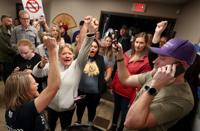
Several dozen crowd the lobby of the Vail Education Center and begin "electing" their own board of governors after the Vail School District governing board meeting was shut down before it could begin, Tucson, Ariz., April 27, 2021.
Mask protest
Updated
Danielle Charbreck hugs her daughter Jordan who was one of five students who were chosen to speak to officials after a crowd of anti-mask protesters disrupted the Vail School District governing board meeting, Tucson, Ariz., April 27, 2021.
Mask protest
Updated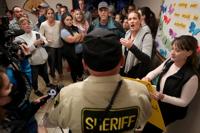
Several dozen people confront a Pima County Sheriff's lieutenant in the lobby of the Vail Education Center after they had been asked several times to leave the facility after the cancelation of the Vail School District governing board meeting.


